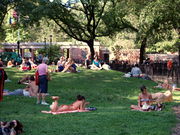Leisure

Leisure or free time, is a period of time spent out of work and essential domestic activity. It is also the period of recreational and discretionary time before or after compulsory activities such as eating and sleeping, going to work or running a business, attending school and doing homework, household chores, and day-to-day stress. The distinction between leisure and compulsory activities is loosely applied, i.e. people sometimes do work-oriented tasks for pleasure as well as for long-term utility.[1] Distinction may also arise between free time and leisure. For example, criticism of consumer capitalism by the Situationist International maintains that free time is illusory and rarely free and instead, economic and social forces appropriate it from the individual and sell it back to him as a commodity in the form of leisure.[2] Leisure studies is the academic discipline concerned with the study and analysis of leisure.
Contents |
Cultural differences

Time for leisure varies from one society to the next, although anthropologists have found that hunter-gatherers tend to have significantly more leisure time than people in more complex societies. As a result, band societies such as the Shoshone of the Great Basin came across as extraordinarily lazy to European colonialists.[3]
Capitalist societies often view active leisure activities positively, because active leisure activities require the purchase of equipment and services, which stimulates the economy. Capitalist societies often accord greater status to members who have more wealth. One of the ways that wealthy people can choose to spend their money is by having additional leisure time.
Workaholics are those who work compulsively at the expense of other activities. They prefer to work rather than spend time socializing and engaging in other leisure activities. Many see this as a necessary sacrifice to attain high-ranking corporate positions. Increasing attention, however, is being paid to the effects of such imbalance upon the worker and the family.
See also
References
- ↑ Goodin, Robert E.; Rice, James Mahmud; Bittman, Michael; & Saunders, Peter. (2005). "The time-pressure illusion: Discretionary time vs free time". Social Indicators Research 73 (1), 43–70. (JamesMahmudRice.info, "Time pressure" (PDF))
- ↑ Situationist International #9 (1964) "Questionnaire, section 12"
- ↑ Farb, Peter (1968). Man's Rise to Civilization As Shown by the Indians of North America from Primeval Times to the Coming of the Industrial State. New York City: E. P. Dutton. pp. 28. LCC E77.F36. "Most people assume that the members of the Shoshone band worked ceaselessly in an unremitting search for sustenance. Such a dramatic picture might appear confirmed by an erroneous theory almost everyone recalls from schooldays: A high culture emerges only when the people have the leisure to build pyramids or to create art. The fact is that high civilization is hectic, and that primitive hunters and collectors of wild food, like the Shoshone, are among the most leisured people on earth."
Further reading
- Peter Borsay, A History of Leisure: The British Experience since 1500, Palgrave Macmillan, 2006, ISBN 0333930827
- Cross, Gary S. 2004. Encyclopedia of recreation and leisure in America. The Scribner American civilization series. Farmington Hills, Michigan: Charles Scribner's Sons.
- Harris, David. 2005. Key concepts in leisure studies. London: Sage. ISBN 0761970576.
- Jenkins, John M., and J. J. J. Pigram. 2003. Encyclopedia of leisure and outdoor recreation. London: Routledge. ISBN 0415252261.
- Rojek, Chris, Susan M. Shaw, and A.J. Veal (Eds.) (2006) A Handbook of Leisure Studies. Houndmills, UK: Palgrave Macmillan. ISBN 139781403902788.
- Stebbins, Robert A. 2007. Serious leisure: A perspective for our time. New Brunswick, NJ: Transaction. ISBN 0765803631.
- Huzinga, Johannes. ____. Homo Ludens
- Grudin, Robert. ____.Time and the Art of Living
- Pieper, Josef. ____. Leisure, Basis of Culture
- Czikszentmihaly, Mihaly. ____. Flow
External links
- Peter Burke, The invention of leisure in early modern Europe, Past & Present, February 1995
- The Development of Leisure Amongst the Social Classes During the Industrial Revolution
- The Serious Leisure Perspective
- [1]